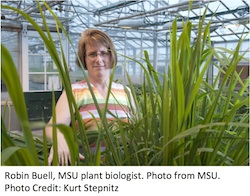The U.S. Department of Energy (DOE) along with the U.S. Department of Agriculture have awarded $1 million to Michigan State University (MSU) to develop hardier switchgrass. The feedstock is a North American native plant that holds great potential as a biofuel source. The research team believes that if switchgrass would better survive northern winters, the plant could be an even better source for clean energy.
Robin Buell, MSU plant biologist, will work to identify the genetic factors that regulate cold hardiness in switchgrass. “This project will explore the genetic basis for cold tolerance that will permit the breeding of improved switchgrass cultivars that can yield higher biomass in northern climates,” said Buell, also an  MSU AgBioResearch scientist. “It’s part of an ongoing collaboration with scientists in the USDA Agricultural Research Service to explore diversity in native switchgrass as a way to improve its yield and quality as a biofuel feedstock.”
MSU AgBioResearch scientist. “It’s part of an ongoing collaboration with scientists in the USDA Agricultural Research Service to explore diversity in native switchgrass as a way to improve its yield and quality as a biofuel feedstock.”
One of the proposed methods to increase the biomass of switchgrass is to grow lowland varieties in northern latitudes where they flower later in the season. Lowland switchgrass is not adapted to the colder conditions of a northern climate, however, and merely a small percentage of the plants survive. It is these hardy survivors that are the subject of Buell’s research.
“Dr. Buell’s investment in this collaborative project will identify important genetic elements in switchgrass that control survival over the winter and can be used to breed better adapted cultivars to meet biomass production needs,” noted Richard Triemer, chairperson of the plant biology department.
Buell hopes to identify alternative forms of the same gene that is responsible for cold hardiness by studying switchgrass’ genetic composition, These could then be applied in breeding programs for switchgrass that can thrive in northern climates.

